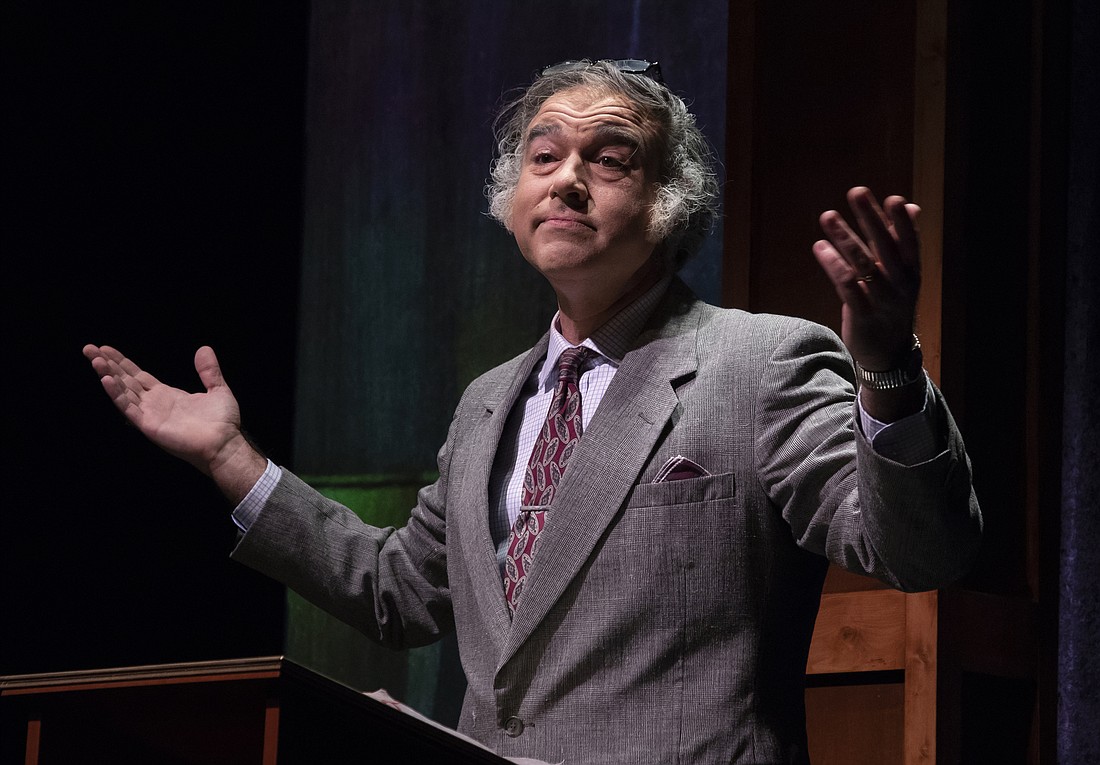- April 11, 2025
-
-
Loading

Loading

William Kunstler was a lion of the law. He roars in Jeffrey Sweet’s “Kunstler.” It’s Florida Studio Theatre’s latest Stage III production.
The play unfolds in 1995. Kunstler (Sam Mossler) is giving a lecture at Columbia University in New York City. Before he takes the stage, he has to walk through a
cordon of unseen protestors shouting, “William Kunstler is a traitor!” Kerry (Anique Clements), the college representative, introduces him with a curt, “There are a handful of people about whom one can say they need no introduction, and tonight’s speaker is one of those.” Kerry’s body language tells you she’s not happy he’s here — and she just might agree with the protestors.
After taking the lectern, Kunstler launches into a rundown of his greatest hits. He lays out his cases defending the Freedom Riders, Jerry Rubin and Abby Hoffman and other members of the Chicago 7, and the American Indian Movement protestors who occupied Wounded Knee in 1973. During the Attica prison riot, Kunstler put his body on the line to stand up for the inmates who’d taken hostages and occupied the penitentiary in a push for humane conditions. He tried to prevent a massacre — and failed.
Sweet’s script hews close to Kunstler’s actual, eloquent words as the flamboyant lawyer looks back in anger on his high-profile cases. At one point, the lawyer details a long list of legal murders, from Socrates to Jesus to the victims of the Holocaust. Conclusion? “I suspect that more good men have gone to their deaths through legal systems than through all the illegalities in the history of man.”
Molotov cocktail rhetoric aside, the playwright has a clear grasp of Kunstler’s legal theory — and his strategy. You could teach an introductory law course from this play. Movement Law 101: The Theory and Practice of Social Change through Civil (and Uncivil) Disobedience.
As a movement lawyer, Kunstler’s key tactic was to put the system itself on trial. The government’s counterstrategy was to define each case as narrowly as possible. Russell Banks was trespassing, period. This strategy often plays out as conspiracy. In the Wounded Knee trial, the fix was clearly in. Kunstler relates a farcical anecdote worthy of the Marx Brothers. He’d noticed a door ajar. When he stealthily opened it, two eavesdropping FBI agents toppled out. The judge was not amused. He’d started out as Kunstler’s enemy — then threw the case out of court.
Sweet’s biography could easily be a hagiography. The playwright prevents that by not making it a one-person play. Kerry functions as a foil. Kunstler knows she has a beef with him and tries to win her over. His cases become an apologia — a justification for his life.
Mossler delivers a blistering, full-throttle performance as Kunstler. The resemblance is uncanny. Based on clips of Kunstler on PBS, the actor’s got the lawyer’s body language and vocal delivery down. Beyond that, he’s captured the way Kunstler’s mind moved. Simply brilliant. Clements’ Kerry has to hold her peace for most of the show. But she beautifully conveys a sense of the wheels in her mind turning. And a slow burn in her heart.
Jason Cannon’s direction smartly captures the essence of a play that boils down to legal argument. It’s all about words — more importantly, the passion and logic behind those words. The words reveal the man. Cannon makes sure nothing gets in the way of that revelation.
At the end of it all, Kerry states her objections to Kunstler. His advocacy for mobster John Gotti, subway shooter Colin Ferguson and Yusef Salaam (of the Central Park Five) top the list. Kunstler protests, “When I see the force of the government cloaking itself in the garb of legality and going after someone who is at a particular disadvantage … it’s my impulse to try to level the playing field.” Noble sentiment. But does it apply to John Gotti? Perhaps he protests too much. On the other hand, Yusef Salaam was eventually proven innocent. Is Kunstler a sellout or a true believer?
This razor-sharp play doesn’t render a decision. It gets the wheels of your mind turning and paints a compelling portrait of this legal lion and leaves the verdict up to you.